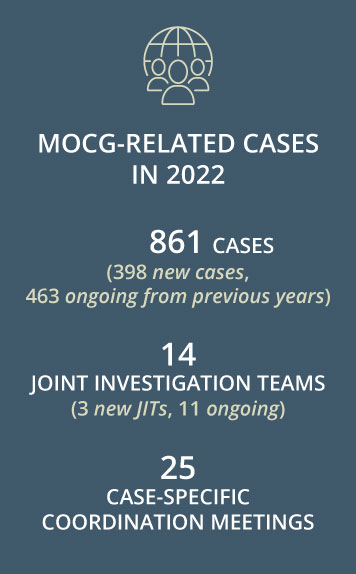
Operational support to organised crime cases
During 2022, Eurojust dealt with a higher number of organised crime cases and arranged more coordination meetings in this area, compared to the previous year.
More than 800 organised crime cases, nearly 400 of which were newly opened in 2022, were handled by the Agency.
Organised OCGs are active in many crime areas, including theft and property crime, and move around quickly within and across multiple jurisdictions. Close cooperation across borders is therefore crucial to detect them and build a solid prosecution case to achieve justice.
During 2022, Eurojust dealt with a variety of cases ranging from drug trafficking and extortion committed by a mafia-style OCG to criminal networks involved in human trafficking, robbery and fraud.
Six suspects indicted in France for extortion and taking jewellers and their families hostage in Switzerland

Crime: In November 2021, heavily armed and masked OCG members take the manager of a high-end jewellery and watch factory in the Jura region hostage, to later force him to open his enterprise. His wife and two young children are also taken hostage. The company’s premises are looted, and the suspects escape with over 70 kilos of precious metals and top-end Swiss watches.
In January 2022, the OCG members abduct another businessman in the Neuchatel region, as well as his pregnant wife and drive them to the store, where they also take two employees hostage. After a private security service is alerted, they set off without any loot, hijack a car and cross the border to France. During a police chase, two members of the gang are arrested.
Action: With the support of Eurojust, two JITs are set up, allowing French authorities to travel to Switzerland to meet their Swiss counterparts at the crime scenes. During a coordinated action in October 2022, 14 suspects are interrogated in an operation involving 60 police officers.
Result: Six other OCG members are arrested and indicted for extortion, the attempted murder of a police officer and gang membership, among other charges. Several luxury cars, three stolen weapons and illicit drugs are seized.
Eurojust's Role: In addition to supporting and financing the two JITs, Eurojust organises four coordination meetings with the French and Swiss authorities to prepare for the operation.

Mafia-style organised crime groups
Eurojust’s casework in 2022 gave rise to a series of insights concerning mafia-style OCGs. These criminal groups increasingly have a transnational dimension. While their main decision bodies are still located in their Member State of origin, these OCGs also have permanent cells located in several other Member States. In some cases, the OCGs are capable of fully exerting their power in other territories, using the usual mafia means and modalities.
Furthermore, Eurojust casework confirms that different OCGs often cooperate together in networks. Some OCGs are specialised in offering specific criminal services, such as money laundering, to other OCGs.
OCGs continue to develop and evolve, as shown by their rapid adaptation to the coronavirus pandemic through online crime. Cross-border cooperation therefore remains essential to tackling these complex and constantly evolving criminal networks.
Eurojust co-leads in EMPACT Operational Action Plan on High Risk Criminal Networks
Eurojust is a co-leader in several Operational Actions within EMPACT, including the Operational Action Plan for High Risk Criminal Networks. This Action Plan aims at fostering cooperation in the identification and investigation of high-value targets. Due to the poly-criminality associated with high-risk criminal networks, the Action Plan tackles a wide range of crime types. For the first time within EMPACT, the judiciary is leading operational actions.
A kick-off meeting of the Operational Action dedicated to the ‘Ndrangheta and the Sicilian mafia, co-led by Eurojust and the Italian Direzione Nazionale Antimafia and Antiterrorism, took place in May 2022. A key outcome of the meeting was the adoption of common guidelines on how to share operational information between judicial and law enforcement authorities worldwide when dealing with high-risk criminal networks.
Action against Italian mafia in Spain: 32 arrests
Crime: Two OCGs operating in Italy and Spain with suspected links to the ‘Ndrangheta mafia are allegedly involved in drug trafficking, money laundering and extortion.
Action: During an action day carried out in Spain, 32 suspects are arrested and 40 places searched across Ibiza, Barcelona, Malaga and Tenerife.
Result: EUR 300 000 in cash, 18 kilograms of amphetamine and 4.5 kilograms of cocaine are seized, as well as firearms and ammunition. A cannabis plantation with 600 plants is also dismantled during the operation.
Eurojust's Role: The Agency assists the Italian and Spanish authorities by hosting two coordination meetings with the aim to facilitate the judicial cooperation and the exchange of information between the competent judicial authorities. Eurojust’s coordination is essential to clarify the nature of the links and to devise a common strategy to support the investigation, which culminates in the organisation of the action day in Spain.


EU Strategy to tackle Organised Crime 2021–2025
The EU Strategy to tackle Organised Crime 2021–2025 sets out the tools and measures to be taken over the next five years to boost law enforcement and judicial cooperation and disrupt the business models and structures of criminal organisations across borders, both on- and offline.
In November 2022, Eurojust participated to a meeting on the implementation of the Strategy, organised by the European Commission. Member State participants were informed about the progress of the implementation of the Organised Crime Strategy and exchanged best practices in the fight against organised crime. The meeting was a follow-up to the brainstorming session involving EU agencies and Member States in February 2021 to prepare the new EU Strategy, in which Eurojust also participated. According to Eurojust’s perspective, the recovery of criminal assets and the cross–border dimensions of modern OCGs are certainly areas where improvements are necessary. This includes broadening the current legal instruments and enhancing the harmonisation of EU legislation.
Eurojust joins Organised Action to fight OCGs from Ukraine and Russian-speaking countries
In March 2022, following the Russian invasion of Ukraine, the European Commission presented the 10-point Plan that aims to ensure stronger European coordination on welcoming people fleeing the war in Ukraine. The Plan addresses the internal security implications of the war, ensuring maximal vigilance against organised crime.
In response to the Plan, the ‘EMPACT Community’ was launched under the French Presidency, and specific Operational Actions were set up to ensure a coordinated approach among EU Member States, agencies and institutions. During 2022, Eurojust participated in the ‘EMPACT Community’ meetings, and became a participant in the Operational Action on OCGs from Ukraine, Russia and other Russian-speaking areas.
